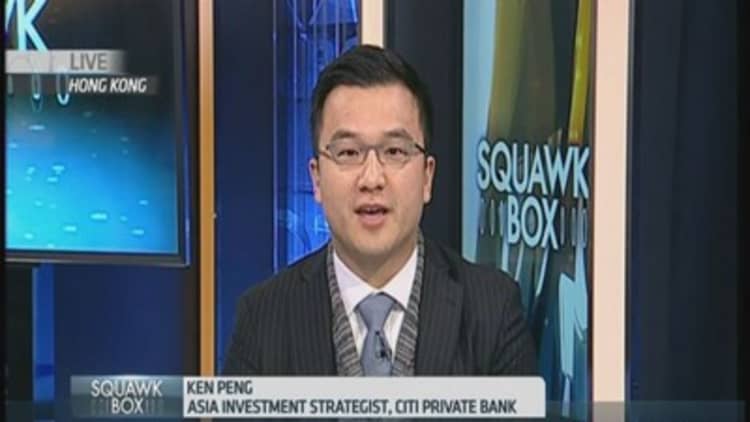Asian stock markets mostly advanced on a data-light Monday as the rally on Wall Street boosted risk appetite, but Japan's benchmark index erased earlier gains and turned negative on news of a possible Ebola case in Tokyo.
With the absence of data releases, attention fell on Malaysia's budget carrier AirAsia, whose shares tumbled over 7 percent to a four-week low of 2.690 , after briefly opening down 12 percent to its lowest level since November 28. The stock's dismal performance follows the vanishing of flight QZ8501 bound to Singapore from Indonesia early Sunday.
Malaysia's benchmark FTSE Bursa Malaysia KLCI index, where AirAsia is listed, was flat on Monday.
Nikkei falls 0.5%
Japanese shares surrendered early gains following an announcement by the health ministry that a man in Tokyo is being tested for possible Ebola infection. The Japanese man had returned to Japan from Sierra Leone earlier this month, where he stayed for eight days.
In the morning session, the benchmark Nikkei 225 index clinched a three-week high of 17,914 as traders digested news from Saturday that Japan's government approved stimulus spending worth $29 billion. Also boosting sentiment was a Reuters survey which showed that top Japanese firms are planning to use their cash reserves to boost shareholder returns in 2015.
Index heavyweights turned south in the afternoon session; Fast Retailing, owner of clothes brand Uniqlo, and mobile carrier Softbank receded 1 and 0.6 percent each.
Fujifilm Holdings was one of the exceptions which benefited from the Ebola news. The firm which said in November that it expected its Ebola-related drug to be approved as soon as the end of 2014, added 0.4 percent.
The yen, which was nearly flat after trading in a tight range all day, curbed gains in exporters. Toyota Motor reversed gains to settle down 0.4 percent, while Suzuki Motor and Nintendo extended losses to lose nearly 2 percent each.
Read MoreTaste for imports drives up Japan's grocery bill
Mainland indices up
China's Shanghai Composite index trimmed gains to 0.4 percent late Monday, after hitting its highest level since December 2010 earlier on the back of a report which said that the People's Bank of China (PBOC) will change rules governing how loan-to-deposit ratios are calculated at banks starting from next year.
The move, seen as a boost for liquidity conditions, lifted the financials and insurers. China Life Insurance rose the maximum allowable of 10 percent while China Pacific Insurance rallied 6.8 percent.
Hong Kong reopened for trade after closing for the Christmas holiday last week. The Hang Seng index added 1.8 percent to reach a three-week high.
CITIC Securities, which announced that it is planing a new public issue of up to 1.5 billion Hong Kong-listed H-shares to supplement capital for its expansion, jumped 3.8 percent.

ASX rises 1.5%
Australia's key index finished at a six-and-a-half-week high of 5,473 as it resumed trade for the first day after being shut last Thursday and Friday for the Christmas holiday.
Gold stocks led advances after spot gold traded near its highest in nearly a week on Monday. Alacer Gold rocketed 12.2 percent while Evolution Mining and Newcrest Mining closed up 9 percent and 4.7 percent, respectively
Retailers were also buoyed by reports saying that sales in the five days before Christmas were 13 percent higher than a year ago. Myer advanced more than 8 percent while Harvey Norman notched up 1.8 percent at the end of Monday.
Meanwhile, the Australian dollar gained 0.3 percent to trade at US$0.8137 against the greenback.
Read MoreAsia's key focus this week: China PMI
Kospi loses 1%
South Korean equities slipped to a one-week low of 1,927 late Monday while the junior Kosdaq index elevated 0.8 percent.
Hefty losses in the blue chips weighed on the bourse. Steelmaker Posco and KB Financial Group dropped 2.8 and 3.7 percent each, while Hyundai Motor slumped 1.7 percent. Samsung Electronics, which has the biggest weighing on the Kospi index, shed 1.7 percent.
Meanwhile, an index measuring South Korean manufacturers' confidence about the coming month edged up to its highest in 10 months, as sentiment among exporters improved, according to the Bank of Korea on Monday.


